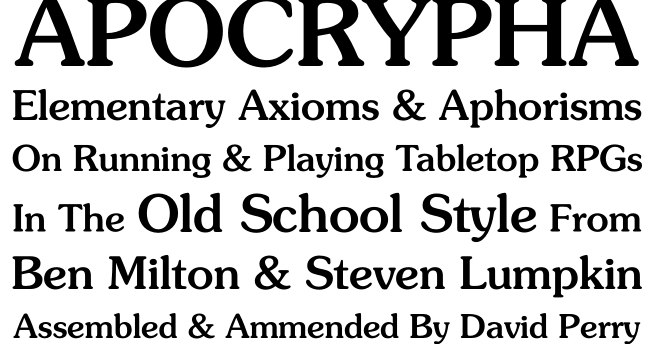So, since this keeps coming up, phrased in one form or another, from more than one preson...
Has anyone here ever heard or read, "People like what they like" and thought, Yes, yes, this is very valuable insight.
Since I am the person who uses that phrase most often, perhaps I should explain it.
When I use it, I am referring to the settled law of Judge John Hodgman. The full phrasing as the following:
People like what they like. You can’t force someone to like something. You can expose them to a piece of work, but if they don’t like it, that’s the way it is. You can’t talk them out of it.
And yeah, I think that is not only a valuable insight, I also believe that if people not only understood it, but tried to apply it, they would find their relationships and lives a lot happier.
At the core is a very simple notion- everyone is not the same. People can have different subjective tastes. If not, we would all have the same hobbies, tastes, and art preferences- for example. More importantly, someone can be really smart, be really knowledgeable about a topic, engage in totally good faith ... and still disagree with you.
If most people think about this for even a second, really really think about this, they know it to be true. Two people who both love movies and film criticism, one who loves Wes Anderson and one who doesn't. Or you can see this in your personal life- maybe you love watching bad horror movies, and your significant other doesn't. Or they love Ornette Coleman, and you don't.
In the end, all you can ask is for someone to try something that you love- to share that experience. And if they don't like it, all the talk in the world isn't going to change their mind. You can't force someone to love what you love.
That's really one of the main takeaways, for me. If someone else loves something, and I see that love, the enthusiasm might convince me to try it. The one thing that almost always fails for me (and, I think, for most people) is when people don't share their enthusiasm, but instead mock you for the things you enjoy. That's a little too "comic book guy" and "gatekeeper-y" for me.*
*EDIT- this, by the way, is why I think that the occasional sneering I see w/r/t having "fun" as a goal is the most counterproductive thing a person can possibly say. Yeah, sure, you want to go deeper than that. But my goodness- it's like a parody of any gatekeeper (comic book guy, record store guy, FLGS guy ... always GUY). "Oh, you like {Insert here} because it's FUN? Harumph." Personally, I love to have fun! If someone tells me a game will be fun, I will be a lot more likely to play it. Sometime later, I might unpack why it was fun, maybe. But yeah, fun is a pretty big goal and a good selling point in a hobby.
Anyway, that's what it means. Share your love, and hope that people love it like you do. But be okay if they don't, because not everyone likes the same things. And that's okay.
How about pointing out that something is inherently immune to critique and pointless to analyze because it's wildly popular?
Not a single person has said. As has been said repeatedly, it would be odd to not analyze something that is popular. Most people would agree that "superhero movies" as a genre are popular, right? Do you think it would be weird if, every time on enworld (on in society as a whole), people wanted to discuss and critique superhero films, the conversation got derailed because someone brought up Lars von Trier and everyone started arguing about Dogme 95?
I do!
I can't for the life of me understand what value either of those have. The only goal or result for either would seem to be to try to end the discussion. They certainly never advance it.
That's an interesting point to make! I mean, it would seem counter-productive for someone to repeatedly spend a lot of their own time creating and starting threads with the purpose of ending discussion.
I've been doing it wrong the entire time! Good catch.
EDIT 2- Seriously, though, the purpose of the first phrase ("People like what they like") is just an acknowledgment that people can have different preferences and that's okay. It doesn't mean you can't have your own opinion, or that you can't critique something- but that at certain point an impasse has to occur for the simple reason that preferences are subjective, and arguing over preferences is counter-productive. As for the second- I have to assume you are recalling things that haven't been happening in this thread, or that I am aware of.
Last edited:



